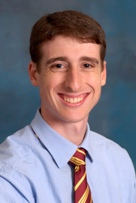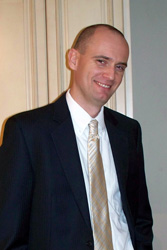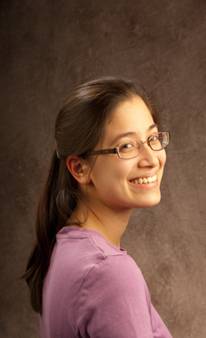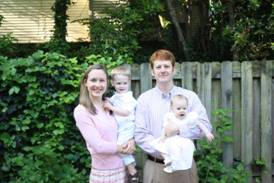William S. Cossen, B.A. in History and Political Science, 2008, is currently pursuing a Ph.D. in history at The Pennsylvania State University. He is focusing on twentieth-century American religious history.
Month / May 2011
Update from Jim Crooks
Jim Crooks, B.A. 1998, History, and High Honors in Physics, went on to get a Ph.D. in physics from UNC Chapel Hill, but switched gears and now has a position at the Environmental Protection Agency, in the Office of Research and Development. He will be part of a biostatistics core facility that provides internal consulting for other agency scientists. He writes, “Most of what I’ll be doing will be epidemiology and bioinformatics, though it strongly depends on who asks for help.” During his most recent job search, he found that one of the aspects of his CV that the “interviewers zeroed in on was a 2nd place award for best essay on Byzantine history that I received while taking Dr. Burns’ class. They found this very reassuring; they were concerned (with some justification) that someone with strong mathematical skills would necessarily be a poor communicator and have narrow interests. Apparently the award convinced them otherwise because I was offered the job.” He and his family enjoy life in the Research Triangle area. He writes, “I have two sons, ages 3 and 6, who are a delight. They are protected by a guard-bunny named Hop. My wife is a human geneticist at Duke, though she will soon be starting a new job at UNC Hospital. We love going to the theater, staying involved with the school system, and being generally over-scheduled.”
He explains that “Durham has–quite unexpectedly–become the hip corner of the Triangle over the last five years. Downtown has come back to life. The arts scene is thriving. And the restaurants… you would be stunned by the selection and quality we have now. Where else can you get a chana masala taco prepared in a red school bus-turned-taco truck?” He concludes, “Neither my wife nor I will ever forget the amazing summer we spent digging up a Roman villa in Pecs, Hungary as part of an Emory history department study abroad!”
Update from Pearl Young
Pearl Young, B.A./M.A. 2010, writes that “It’s been a year of celebration! This year, 2011, Emory turns 175 years old. As assistant to Emory Vice President Gary Hauk, I’ve had the pleasure of hunting down interesting tidbits of Emory history, from putting together a list of the first 175 professors to compiling a calendar of “Today in Emory History“. There have been some truly amazing things that have happened here at Emory, and as a proud Emory alumna, it’s been fascinating to learn more about Emory’s past! We’re home to one of the original primate research centers and are also one of the first schools to study law and religion as a unit; we have alumni who have served as vice president of the United States, as fashion designers, as Pulitzer Prize winners, and more! And, to be sure, there’s much Emory trivia as well. For example, April’s Fools may seem like the perfect day to announce yet another ludicrous claim in the Emory Wheel, but it’s also the anniversary of the original celebration of the formal transfer of Emory College to Emory University.”
In the fall, Pearl will be starting a history Ph.D. program at the University of North Carolina, Chapel Hill. She writes, “I’m looking forward to being in a new place and studying something different. But I know that my heart will often be turning around old Emory’s shrine.”
Update from Robert Elder
Robert Elder, Ph.D. 2011, had an article accepted to the Journal of Southern History. He is taking a two-year postdoctoral position in the Lilly Fellows Program at Valparaiso University in Indiana. His dissertation examines the intersection of evangelicalism and honor culture in the nineteenth century American South, under the direction of Professor James Roark.



